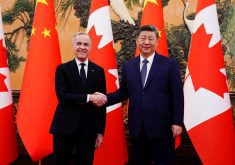Canada faces many issues internationally that are going to determine the success or failure of its agri-food sector.
Is enough being done to address them? That was the subject of a recent summit in Ottawa that John Greig attended on behalf of Glacier FarmMedia.
One of the latest and most-hyped endeavours in the agriculture sector was the Barton Report’s goal of growing food exports from $55 billion in 2017 to $75 billion. There has definitely been some growth.
Read Also

OPINION: Ag Days 2026 moved talk from trade anxiety to tactics
Farmers, speakers and exhibitors at Manitoba Ag Days 2026 were again talking trade uncertainty and tariffs, but this year’s tone felt more proactive.
As Greig’s article reports, some say the country has already hit that dollar figure.
But what looks like a success story is actually a missed opportunity, that event also heard. Most of that increase is due to increased prices for agriculture commodities and food products.
Canada’s global market share, the true metric of growth, has remained stagnant.
When you look at what Canada’s done to promote growth, it’s little wonder. There has been a flurry of press releases and funding announcements that seem to have little coherence. And no significant progress on fundamental issues like securing market access.
Many in the agri-food sector have long called for a new and more proactive strategy that would employ trade specialists on the ground in key markets, set to address potential trade disruptions while they’re smaller and more manageable.
But rather than that we saw the Chinese canola market closed to major Canadian exporters while the WTO proved toothless, and our trade ‘partners’ in the European Union stubbornly refusing to open their market to Canadian beef in any meaningful way despite a free trade agreement.
If we truly want to be the global food superpower that many envision, we’re going to have to do so in a global market that is increasingly skeptical of trade.
These days we can’t seem to get national act together to accomplish anything, and the reason for that seems to lie with our political leadership. Or us, for listening to them.
They’re too busy finding wedge issues to drive voters apart, hoping they’ll then find the path to power that only a majority government delivers, where they can spend time addressing the challenges the country faces.
Meantime inflation runs rampant, the medical system seems set to implode and there’s a housing crisis that’s led to shanty towns on the streets of many urban centres.
But rather than working together for the good of all Canadians, we’re treated to the spectre of one side of the Commons crowing that Canada’s broken and the other side insisting everything is fine, we couldn’t be better.
As always, with politicians, the truth lays somewhere in the middle.
Canada is still a reasonably well-functioning democracy. I can, for example, write this editorial without fear the authorities will show up at my door in the middle of the night to haul me away. And while our leaders might not pay much attention to us between elections, they do still come and go at the will of the electorate. For all of this we should be grateful.
But increasingly it’s also a country that fails to address some pretty basic bread-and-butter pocketbook issues of citizens in favour of grand visions.
Our telecom sector is the prime example. It’s more akin to the old Family Compact of Upper Canada than a functioning marketplace, and captive regulators pay the issue little attention. And as a result Canadians pay some of the highest wireless rates in the world.
We’ve seen our toothless competition regulators attempt to address the issue, with little luck. Unless our political leaders have the regulators’ backs in this fight, it will go nowhere.
Don’t hold your breath waiting for progress. Both of the major parties have known about this issue for decades. And during this time, both have been in power and failed to address the issue in any meaningful way.
They’ve fiddled around the edges with codes of practice while ignoring the reality of the situation — there’s simply not enough competition in the market. And the only way to get it is to start breaking up some of these too-large entities into smaller players with less market power.
Can a country that isn’t even willing to address an issue as clearcut as this hope to make any progress on more complex files, like international food and agriculture trade?
Canada is a country that’s done great things in its history. It built a railroad spanning the continent as a condition of its formation. It took a permanent military that was just 4,169 officers and enlisted men in 1939 and grew it to over a million men and women by the end of the Second World War.
This country has accomplished much in its relatively short history, but is it up to the challenges ahead?
That’s up to all of us.















